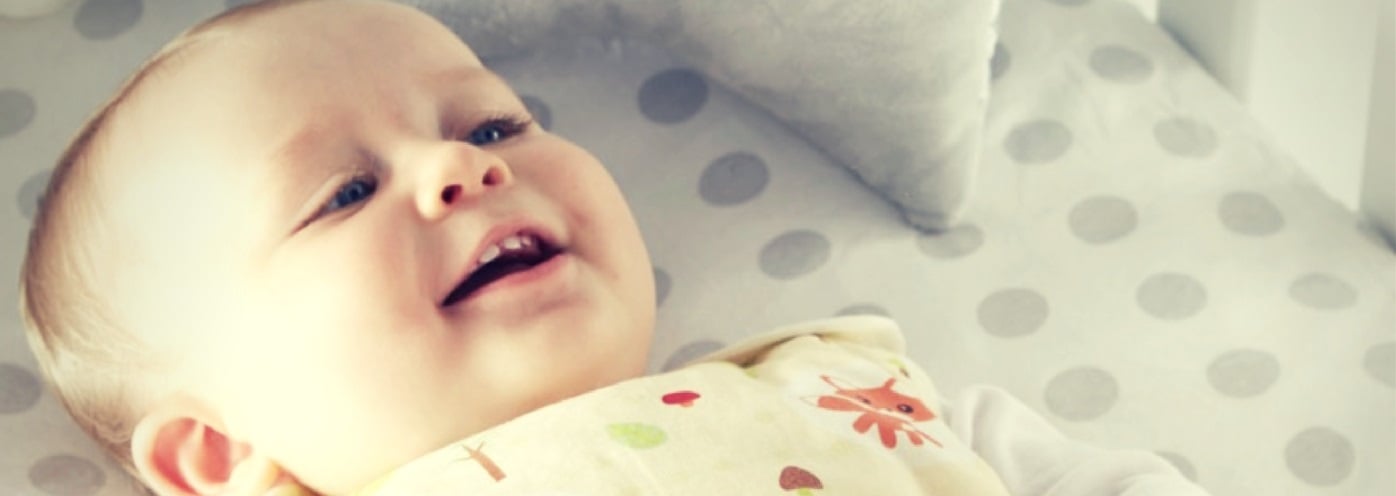Teething and Sleep: How to Help A Teething Baby
Teething can be a difficult time for babies and their parents too. And when teething disturbs your baby’s sleep it can make everyone feel drained and grumpy. So, what can you do? Learn how to help a teething baby sleep with our tips and advice.

What are the signs of baby teething?
Unsure if your baby is teething yet? Here are some of the most common signs of baby teething to look out for:
- Sore, angry-looking gums: Red gums are often a sign that a new tooth is emerging.
- Increased dribbling: This is one of the common signs of baby teething, particularly in younger babies.
- Pink, flushed face: You’re likely to notice this particularly on one cheek, close to where the tooth is coming through.
- Irritable or grumpy mood: It’s no real surprise that if your baby is experiencing pain caused by a new tooth, they may well appear to be grumpier or more irritable than usual.
- More chewing or sucking: Your baby may seek relief from the discomfort of teething by chewing or sucking – whether on a teething toy or other items.
- Reduced appetite: Sore gums may put your baby off eating.
- Difficulty sleeping: Frequency waking or struggling to settle can be signs that your baby is experiencing teething pain at night and discomfort caused by teething.
Of course, while the above can be signs of teething, they can also be symptoms of other conditions. If in any doubt, speak with your GP or health visitor for advice.
How early can babies teeth?
Most babies begin to get their first teeth between the ages of five and seven months. The first teeth to come through are normally the bottom front ones, although this isn’t always the case.
How long does teething last?
Teething symptoms can last as long as it takes for your child’s teeth to come through. Once the tooth is fully through the gum, the discomfort should calm down. This cycle can start again when a new tooth begins to come through – however, your baby won’t necessarily experience teething pain at night with every single new tooth.
By the time your child reaches the toddler phase your teething troubles should start to calm down. According to the NHS, most children have all their milk teeth by the time they’re two and a half.
Why is baby teething pain worse at night?
While many parents notice that their baby’s teething symptoms are worse at night, the verdict from the scientists is still out on this one. The most logical explanation is that tired babies are more likely to be aware of their discomfort, as they’re not distracted by other activities.
How to help a teething baby sleep
Teething baby not sleeping? While teething in the day is challenging enough, bedtime brings its own problems. After all, if baby can’t get settled, they’ll likely be even more cranky and irritable during the day – and less able to cope with teething troubles.
So let’s look at how to help a teething baby sleep better:
- Consider night-time teething gels: Specially designed teething gels can provide your baby with temporary relief from tender gums, helping them to settle down to sleep. Look out for gels that are suitable for night-time use and purposely designed for babies. It’s worth noting that many teething gels are only suitable for babies aged four months and over.
- Provide cuddles and comfort: One of the simplest ways to soothe your baby back to sleep – cuddles, comfort or a bedtime story may all help to take your baby’s mind temporarily away from their discomfort.
- Create a soothing sleep environment: While teething at night doesn’t have to interfere with your baby’s sleep, if you can help them to get settled more easily, this can reduce the chances of them waking in the night – and becoming aware of their discomfort. Focus on making their cot or crib as sleep-enhancing as possible. Start by dressing your baby in natural, breathable cotton nightwear, then choose a lightweight baby sleeping bag to keep them comfy without overheating. Older babies (twelve months plus) may prefer a duvet to a sleeping bag. In either case, look out for wool bedding as this natural material is proven to help regulate body temperature throughout the night more effectively than synthetic or feather/down alternatives.
Discover more tips to help your little one snooze better in our Baby Sleep Advice hub.